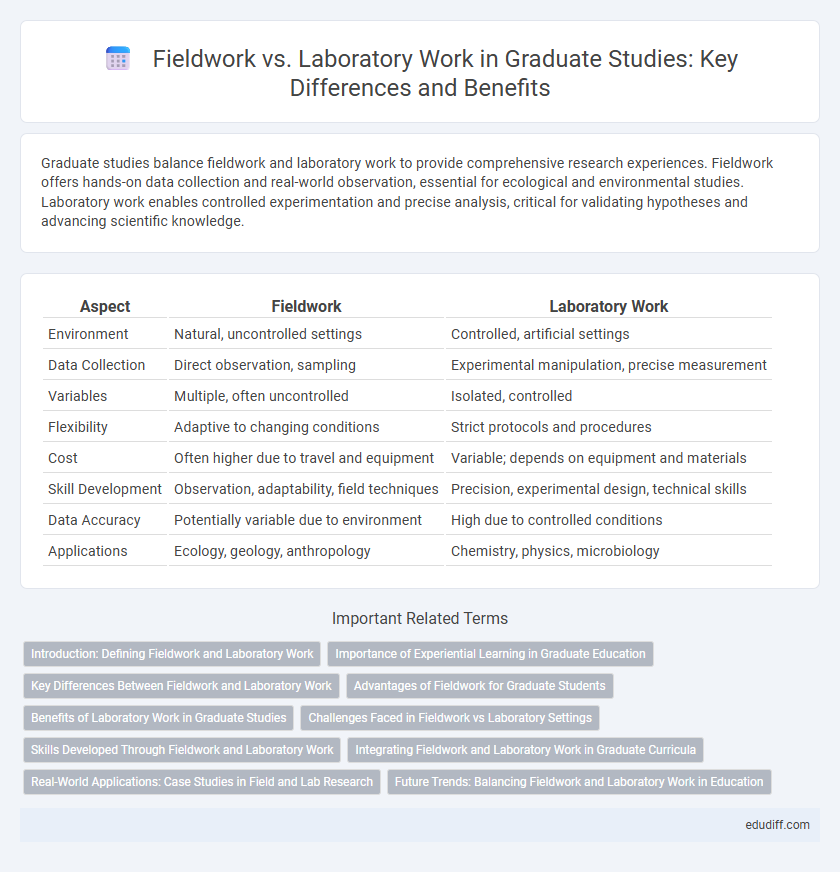Graduate studies balance fieldwork and laboratory work to provide comprehensive research experiences. Fieldwork offers hands-on data collection and real-world observation, essential for ecological and environmental studies. Laboratory work enables controlled experimentation and precise analysis, critical for validating hypotheses and advancing scientific knowledge.
Table of Comparison
| Aspect | Fieldwork | Laboratory Work |
|---|---|---|
| Environment | Natural, uncontrolled settings | Controlled, artificial settings |
| Data Collection | Direct observation, sampling | Experimental manipulation, precise measurement |
| Variables | Multiple, often uncontrolled | Isolated, controlled |
| Flexibility | Adaptive to changing conditions | Strict protocols and procedures |
| Cost | Often higher due to travel and equipment | Variable; depends on equipment and materials |
| Skill Development | Observation, adaptability, field techniques | Precision, experimental design, technical skills |
| Data Accuracy | Potentially variable due to environment | High due to controlled conditions |
| Applications | Ecology, geology, anthropology | Chemistry, physics, microbiology |
Introduction: Defining Fieldwork and Laboratory Work
Fieldwork involves collecting data and observations directly from natural environments, enabling hands-on experience and real-world context. Laboratory work centers on controlled experiments within a specialized setting, allowing precise manipulation and measurement of variables. Both methodologies are essential for comprehensive research, offering complementary insights in graduate-level studies.
Importance of Experiential Learning in Graduate Education
Experiential learning in graduate education, exemplified by fieldwork and laboratory work, fosters critical thinking and practical skills essential for academic and professional success. Fieldwork provides hands-on exposure to real-world environments, enhancing observational and problem-solving abilities. Laboratory work complements this by offering controlled settings for hypothesis testing and experimentation, deepening theoretical understanding and technical proficiency.
Key Differences Between Fieldwork and Laboratory Work
Fieldwork involves collecting data and observations in natural environments, emphasizing real-world variability and context, while laboratory work occurs in controlled settings, allowing precise manipulation and replication of variables. Fieldwork provides insights into ecological validity and environmental interactions, whereas laboratory work offers rigorous testing of hypotheses with minimal external interference. The choice between fieldwork and laboratory work depends on research goals, with fieldwork suited for exploratory studies and laboratory work ideal for experimental validation.
Advantages of Fieldwork for Graduate Students
Fieldwork offers graduate students immersive, real-world data collection opportunities that enhance practical skills and contextual understanding beyond controlled laboratory settings. It enables direct observation of natural environments, fostering adaptability and critical thinking essential for robust research outcomes. Engaging in fieldwork also promotes interdisciplinary collaboration and networking, crucial for career development in academia and industry.
Benefits of Laboratory Work in Graduate Studies
Laboratory work in graduate studies enhances experimental precision by providing controlled environments that minimize external variables, ensuring reliable data collection. It facilitates hands-on experience with advanced instrumentation and techniques, crucial for developing practical expertise and technical proficiency. Furthermore, laboratory settings foster collaborative learning and innovation through direct interaction with peers and mentors, accelerating research progress and academic growth.
Challenges Faced in Fieldwork vs Laboratory Settings
Graduate students encounter significant challenges in fieldwork, including unpredictable environmental conditions, logistical constraints, and limited access to controlled variables, which complicate data collection and consistency. In contrast, laboratory work struggles with artificial settings that may not accurately represent real-world phenomena, alongside equipment calibration issues and stringent time constraints for experiments. Balancing these challenges is crucial for producing robust research outcomes and advancing scientific knowledge.
Skills Developed Through Fieldwork and Laboratory Work
Fieldwork develops practical skills such as data collection, environmental assessment, and adaptability in unpredictable conditions, fostering critical thinking and problem-solving abilities. Laboratory work enhances technical skills like precise measurement, experimental design, and data analysis using advanced instruments. Together, these experiences cultivate a comprehensive skill set essential for scientific research and professional competence.
Integrating Fieldwork and Laboratory Work in Graduate Curricula
Integrating fieldwork and laboratory work in graduate curricula enhances practical skills and deepens theoretical understanding by exposing students to real-world data collection alongside controlled experimental analysis. This approach cultivates critical thinking and adaptability, enabling students to handle complex research challenges across diverse scientific disciplines. Curriculum design incorporating both environments ensures comprehensive training, better preparing graduates for professional and academic careers.
Real-World Applications: Case Studies in Field and Lab Research
Fieldwork provides firsthand data from natural environments crucial for ecological and anthropological studies, enabling researchers to observe phenomena in real-world contexts. Laboratory work allows controlled experiments and precise measurements, vital for fields like molecular biology and chemistry where variables must be tightly regulated. Combining case studies from both approaches enhances the validity of findings and supports comprehensive understanding in graduate research.
Future Trends: Balancing Fieldwork and Laboratory Work in Education
Future trends in graduate education emphasize a balanced integration of fieldwork and laboratory work to enhance practical skills and theoretical understanding. Emerging technologies such as remote sensing, virtual simulations, and digital data analysis are bridging gaps between hands-on field experiences and controlled lab environments. Educational curricula are evolving to incorporate interdisciplinary approaches, enabling students to apply real-world observations alongside experimental research for comprehensive learning outcomes.
Fieldwork vs Laboratory Work Infographic

 edudiff.com
edudiff.com